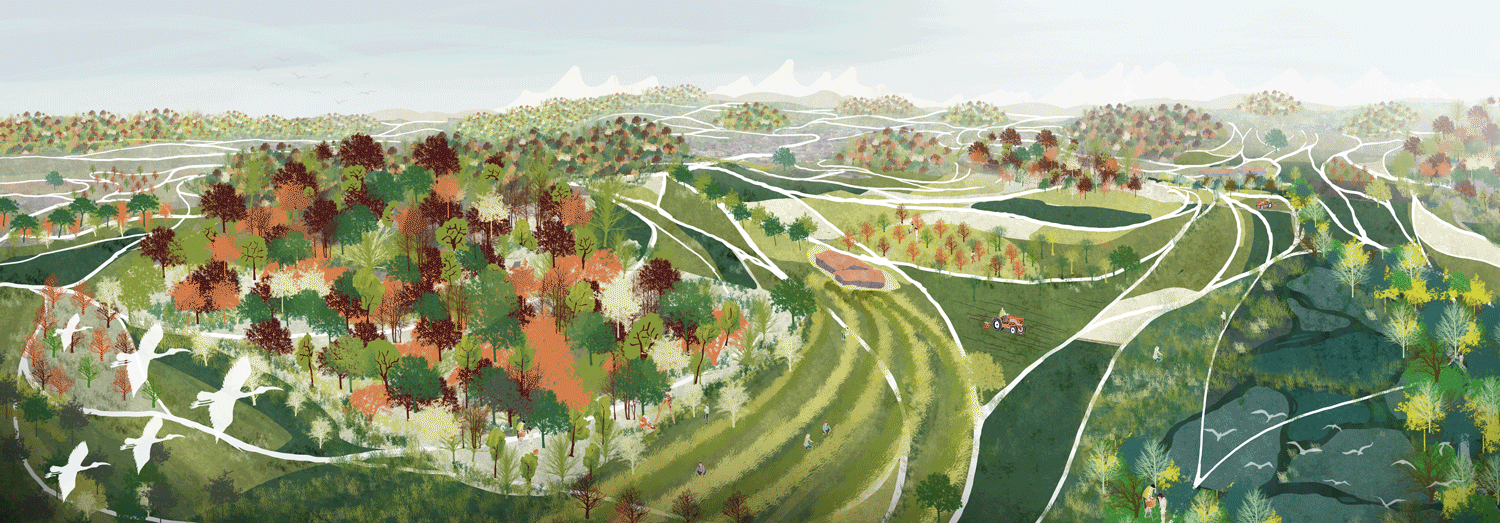
TASTING GROUNDS: Agrobiodiversity Within Swiss Food Systems
TYPOLOGY
Urban Design Research in Zürich, Switzerland
EPFL AND ETH ZüRICH
MAS Urban and Territorial Design 2023
TEAM MEMBERS
Xiang Lin, Maria Jose Castañeda Valbuena, Emma Kaufmann LaDuc and Nabila Pranoto
Full research can be accessed here
Within agro-ecological systems, the conservation of genetic diversity so vital to food security takes place fragmentarily throughout Switzerland. This occurs at the intersection of resistant landscapes and resilient practices. Where physical conditions resist the complete industrialisation of agriculture and social initiatives support unconventional economies, diverse food systems thrive.
Beginning with an understanding of agrobiodiversity in local food systems, we situate this knowledge in a self-defined typology of the mosaic midheights and in the case study of the village Mettmenstetten. We trace the network of production to consumption from the global to the local, challenging the conventional food supply chain through social initiatives. To conclude, we work with and within these niche landscapes and their socio-cultural systems to recontextualise the conservation of genetic diversity.
This research is part of a larger goal to redefine a territory based on its geographical features, productive landscapes and local food systems. With tools like GIS mapping, empirical and historical research, we aim to uncover and highlight the elements of agriculture as the key infrastructure that pave the way towards a more sustainable socio-ecological assemblage in the Global North.
According to the Food and Agriculture Organization of the United Nations (FAO), humanity has already lost three quarters of plant diversity that originally contributed to our diet.
In fact, 61% of our calories are from 12 plant species while 30,000 plants are actually potentially fit for consumption.
VARIETIES AS RESILIENCE. Overcoming genetic erosion in food systems
Global agriculture faces challenges such as biodiversity loss and genetic erosion, resulting in the dominance of uniform, high-yielding varieties. Preserving agrobiodiversity is crucial for resilience in the face of ecological crises. Currently, some alternative practices are challenging the established food system, involving the community in the ownership and cultivation of genetic resources.
Hereby we introduce the concept of food sovereignty, defined as the right of individuals, peoples, communities, and countries to define their own agricultural, labour, fishing, food and land policies which are ecologically, socially, economically and culturally appropriate to their unique circumstances. The aim is to liberate the food supply chain from the gatekeepers of the industry, creating viable alternatives to the current commodification of seed supplies and distributing property rights across communities, actors and lands.
TOPOGRAPHY OF RESISTANCE. Identifying a Cultural and Geological Typology
The intrinsically heterogeneous landscapes of the Midheights sustain both historic and innovative agro-ecological practices, read as biodynamic cultural landscapes. Here, amidst a global loss of genetic resources, we find patches of the past retaining fragments of traditional cultivation of local varieties. Among these sites of landscape heritage is the town of Mettmenstettem: a rich ground for seeding change.
LOCALISED AND DIVERSIFIED AGRO-SYSTEMS: Re-Assembling the Mosaic Midheights
Mettmenstetten's landscape and its pioneers showcase the potential for agro-ecological initiatives in a diverse cultural environment. Tasting Grounds aims to cultivate resilience and disrupt the conventional food system by combining social initiatives and a deep understanding of the unique landscape.
SYNERGISING WITHIN THE LANDSCAPE: Social Networks of Coperation
The third phase revolves around establishing a social network of coISperation among local farmers and restaurants. This network will foster knowledge-sharing, seed exchange, and collaborative efforts aligned with seasonal patterns. By strengthening relationships and promoting synergies, this phase aims to enhance the overall resilience of the region’s agricultural practices. By integrating social and economic dimensions, this phase aims to create a framework that ensures the longevity and resilience of the project.
TASTING VARIETIES: Agrobiodiversity Within Local Food Systems
By intertwining social initiatives with a deep understanding of the unique landscape typology, Tasting Grounds aspires to cultivate resilience and self-sufficiency, forging ahead with the determination to disrupt the conventional food system. We aim to foster the preservation of biodiversity and variety, empowering both growers and consumers alike. Thus in the final phase of our plan, we would close the cycle of agrobiodiversity in Mettmenstetten’s local food systems, focusing on the culinary aspect.
